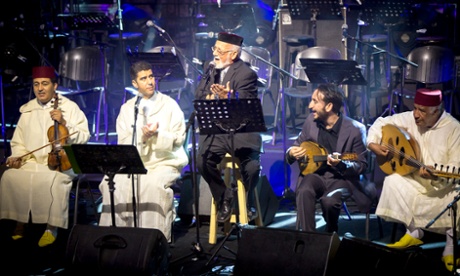
“We will hear the muezzin in a few minutes,” says the rabbi. “They sing about love.” We’re sitting on a rooftop in Jerusalem overlooking the Judean hills as the sun sets. Next to the rabbi is a Muslim sheikh who explains the meaning of Allah u-Akbar: “God is great ... There is no God but God.” That monotheistic deity is just one of many beliefs shared by Jews, Muslims and Christians and why this city is holy for an estimated 4 billion people.
A few moments later, muezzins start their calls to prayer in mosques on all sides. One in the hills, then another close by, until there’s an extraordinary polyphony from dozens of loudspeakers. It’s a magical sound, hovering like a haze over the hills, the car horns and hubbub of the city until at 7pm a bell starts chiming at the abbey on nearby Mount Zion.
This rooftop encounter of Judaism and Islam is just one of the events in the Jerusalem Sacred Music festival, which aims, in the words of executive director Naomi Fortis, “to change hearts, minds and souls and create the potential for peace”.
This is the third year of the festival, which is organised by Jerusalem Season of Culture, but this one came just two weeks after the Gaza war with its horrific asymmetric fatalities (more than 2,100 in Gaza and 74 in Israel) and accusations of war crimes against Israel.
Tension in the city has heightened considerably and organisers decided against using a venue in Palestinian East Jerusalem that has hosted concerts in previous years. “After the events this summer, the need for something like this is more important than ever. I’m not naive; I don’t think we can change the minds of millions of people,” admits Fortis. “But we can change the minds of those who come here and carry them with us so we can create a wider change.”
The main festival venue is the citadel of the Old City of Jerusalem. It’s an imposing crenellated fortress built mainly by the Turks in the 17th century with a landmark minaret, but there are remains of Crusader and Roman buildings as well. Stages and musicians are spectacularly positioned in the folds of the limestone walls that have heard and seen so much.
There were musicians aplenty from the dozens of Jewish communities within Israel – Yemenite, Iranian, Moroccan and eastern European Ashkenazi – but only a few Palestinians. The situation is too polarised. International artists came from the US (the Klezmatics), Jamaica (reggae group the Twinkle Brothers), Brazil (percussionist Nana Vasconcelos), west Africa and Zimbabwe. But the most spectacular concert featured Morocco’s Orchestre Chabab Al Andalous, with Israeli rabbi Haim Louk and an Israeli choir. There is a rich shared repertory of Arab Andalous music, and Louk, born in Casablanca, sings in Hebrew and Arabic over a background of swooping violins, lutes and percussion. It was glorious music – powerful and uplifting – and drew a large audience from many communities. “God gives us different ways to worship,” Louk said to me afterwards, “but there is no difference between your blood and my blood. In music, love and spirituality, there is more in common than difference.”
Two members of the Moroccan group, however, had decided not to come to Israel saying it would be like “dancing on the blood of the children of Gaza”. The rest were present, their spokesperson said, because “we promised to come and we don’t want to close this door to contact and peace”.
Malian singer Salif Keita pulled out of last year’s festival, but there were no high-profile boycotts this time. “The irony is that this is one of the most radical-left festivals in Israel trying to further peace, but it’s being boycotted,” said artistic director Gil Ron Shama. Their current response to the polarisation is a statement of unity by various Jerusalemites – young and old, religious and secular, Jewish, Muslim and Christian – that concludes: “We are here because we have been silent for too long, and will now shout out the voice of hope.”

